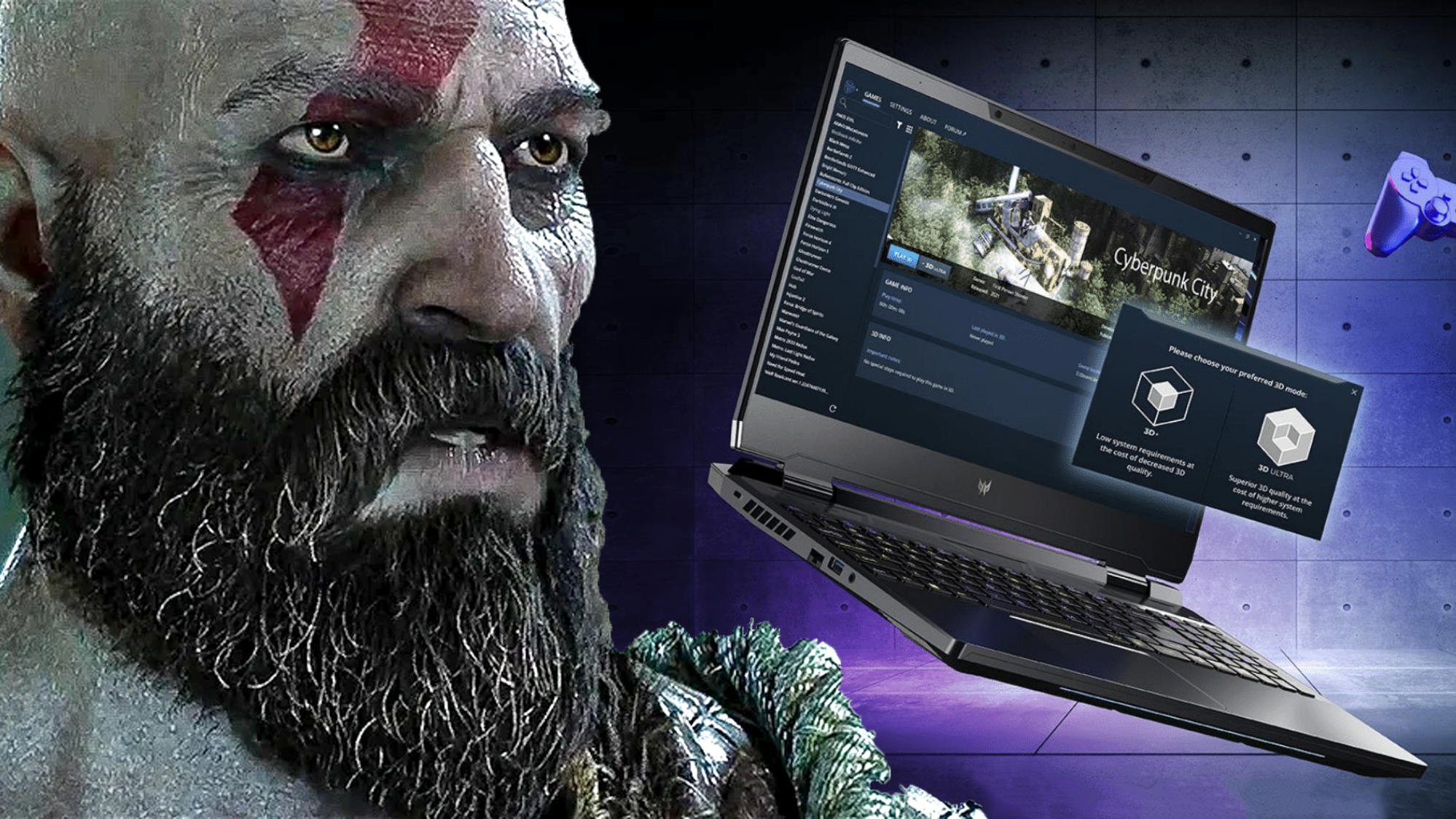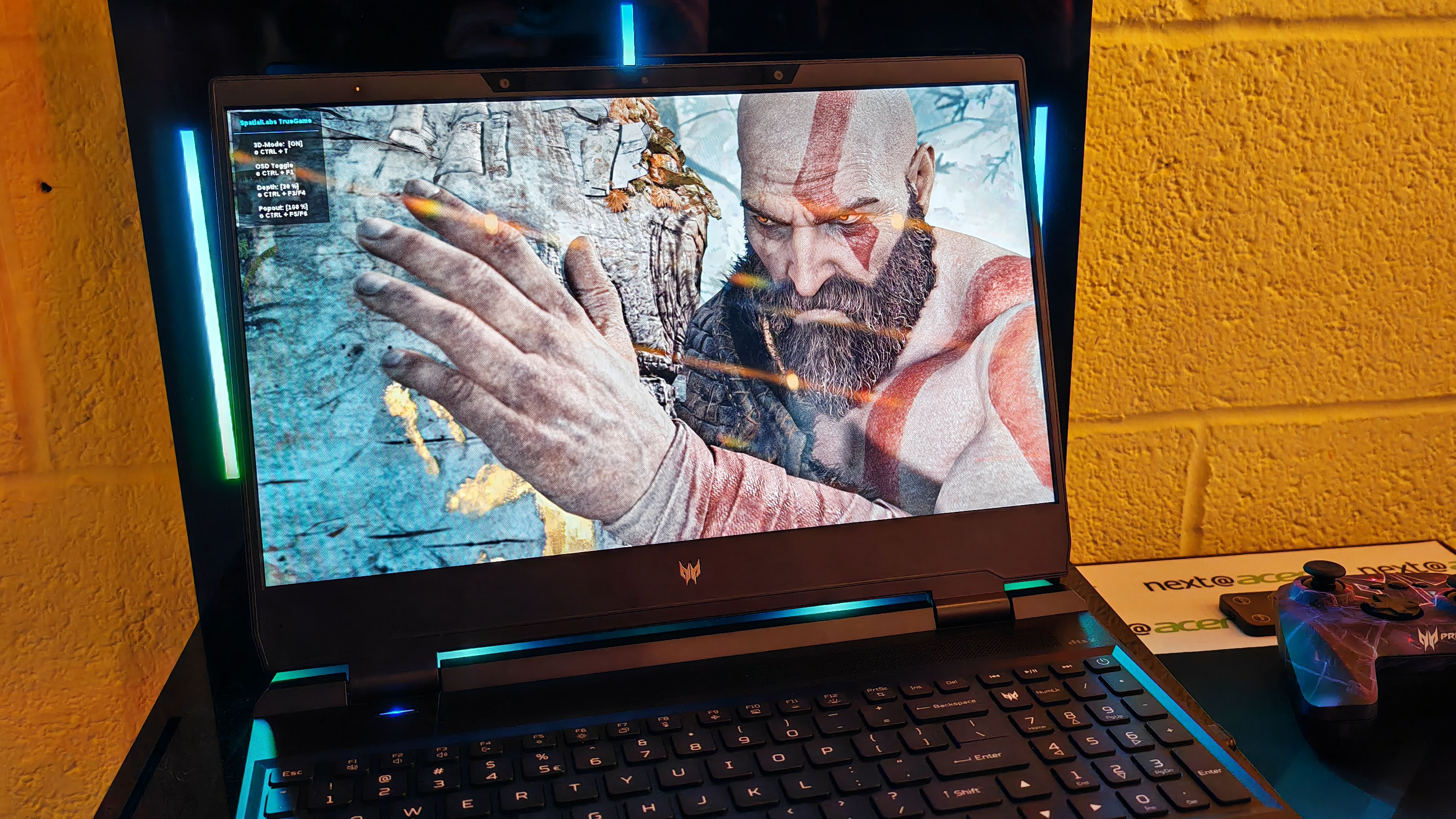
It's already been quite a year for immersive gaming. Having trialled PlayStation VR 2 and seen how that's further opened up the gaming landscape, I didn't expect to be blown away once more with another new technology: glasses-free 3D.
But that's exactly what Acer has given us in its updated Predator Helios 3D 15 SpatialLabs Edition, on which I played God of War in its ultimate upgraded format, '3D Ultra', for which the game's developer, Santa Monica Studios, has dug into the code and made the game truly 3D-ready for specific hardware.
Specific hardware is precisely the point of this Acer gaming laptop with the SpatialLabs display, as at the click of a (virtual) button you can activate the built-in cameras to track your eyes, allowing the software to cleverly present one half of information to one, the other half to your other. It creates a genuinely convincing three-dimensional and deeper visual effect.
What I really like about this Predator laptop, though, is that it's adaptive: flick that button again and you can make the display 'normal', to benefit from its lush 4K resolution, rather than having a panel that's forcing the 3D effect on all things at all times (which wouldn't work anyway, as content has to be tailored - which is why, at the time of writing, there are only 75 games that are 3D optimised).

Watching Kratos take on a more thorough three-dimensional form as I chopped down a tree in the opening sequence was really impressive to see. Especially as I'm hardly the world's most enthusiastic advocate of 3D. But that's because it, for a time, plagued the movie world in almost entirely nothing but a bad way. With SpatialLabs it's more about enhancing what's already there and not making a gimmick of it.
What's also great is the setup process is non-existent: the cameras track your eyes and, well, that's that. I was seeing 3D in a matter of seconds. However, having said that, it can hiccup from time to time when others are in the room, because too many eyes looking to the screen might confuse the system. That's when the 3D effect will 'break' and you'll see the 'overlap' which takes you out of the experience.
So what's the catch? Well, the 2023 Acer Predator Helios 3D 15 SpatialLabs Edition certainly isn't cheap. Pricing starts at £3,299 in the UK for this 15.6-inch gaming laptop.
Get all the latest news, reviews, deals and buying guides on gorgeous tech, home and active products from the T3 experts
But you're not just paying for the screen, as it's also got suitable credentials to be considered one of the best gaming laptops out there. There's an Nvidia GeForce RTX 4080 GPU under the hood, which is why you'll need to have the laptop plugged into the mains for 3D Ultra games such as God of War, ensuring full power delivery is possible (up to 165W). That's paired with an Intel Core i9 'HX' processor and up to 32GB RAM. It's quite the beast.
So while playing God of War in 3D Ultra is an epic experience on the Predator Helios 3D 15 SpatialLabs Edition, it's also quite a pricey one. Although, if you're in the market for an advanced gaming laptop, let's face it, a bunch of models without a special display cost a similar amount. And it's not like there's a cut to other areas of quality and power.
I do think it's the kind of laptop that you really need to see to believe, though, as no amount of pictures or videos on the internet will give you the same experience as interacting with it properly so that SpatialLabs magic can kick in. But when you see it I reckon that you, like I, will be instantly sold on it. Well, if, unlike me, you can afford it anyway...

Mike is T3's Tech Editor. He's been writing about consumer technology for 15 years and his beat covers phones – of which he's seen hundreds of handsets over the years – laptops, gaming, TV & audio, and more. There's little consumer tech he's not had a hand at trying, and with extensive commissioning and editing experience, he knows the industry inside out. As the former Reviews Editor at Pocket-lint for 10 years where he furthered his knowledge and expertise, whilst writing about literally thousands of products, he's also provided work for publications such as Wired, The Guardian, Metro, and more.
